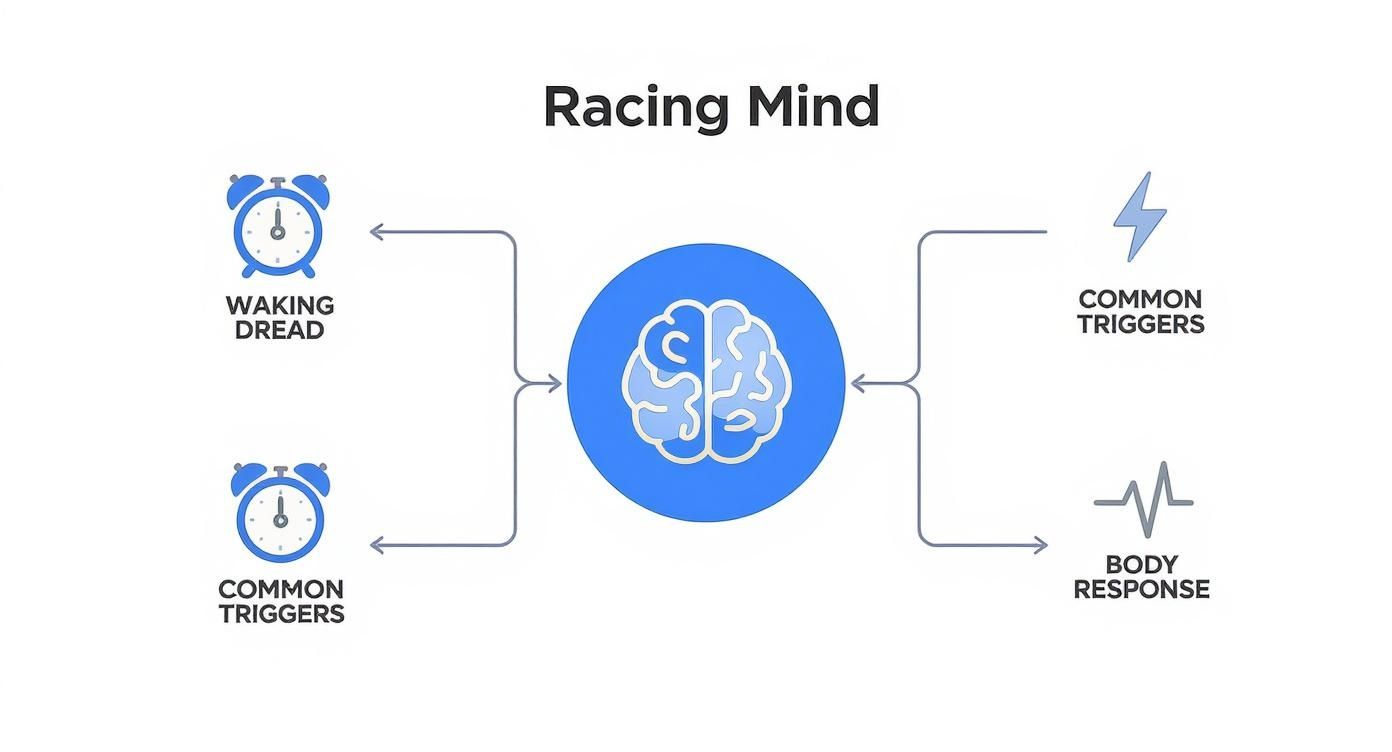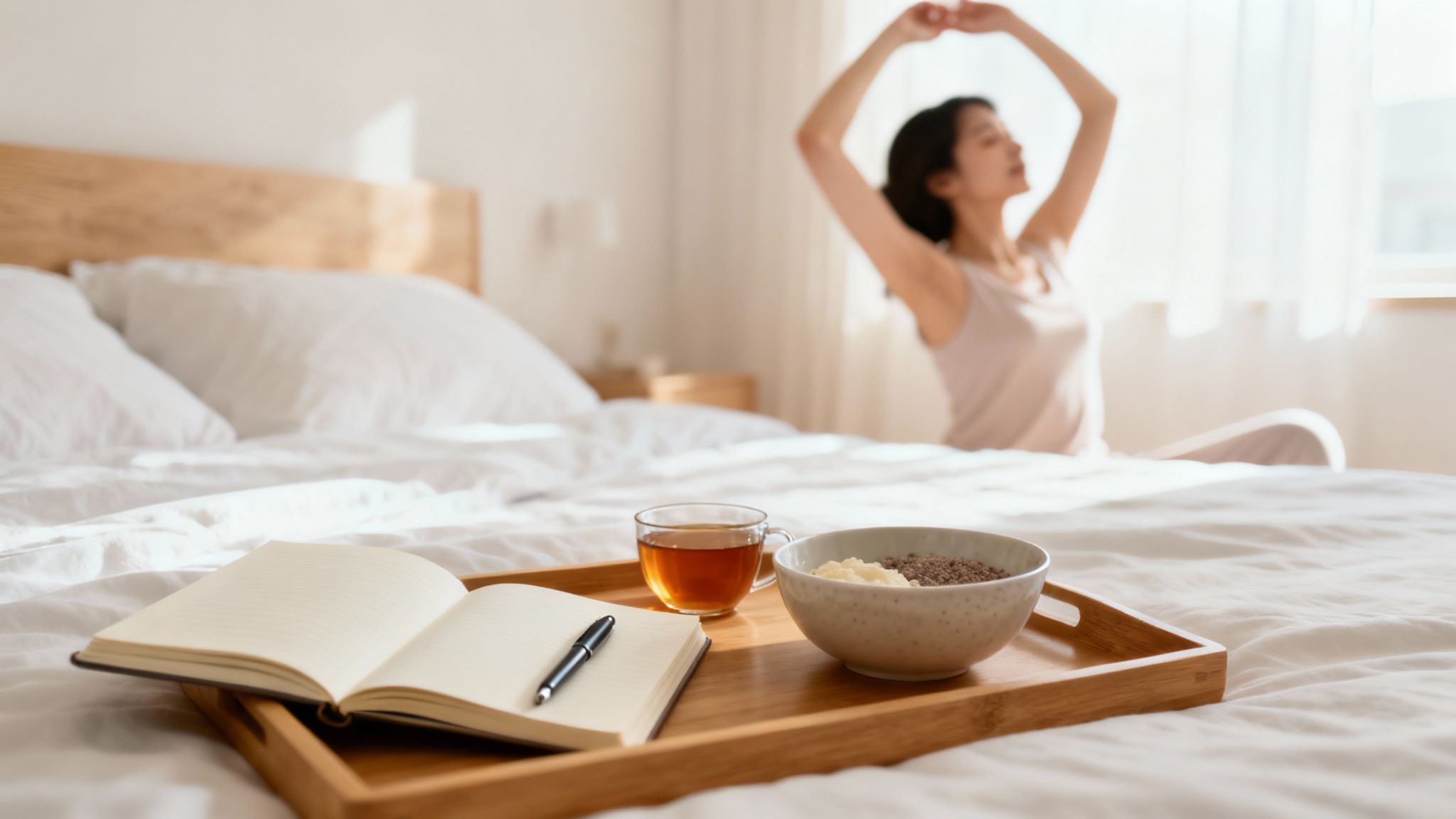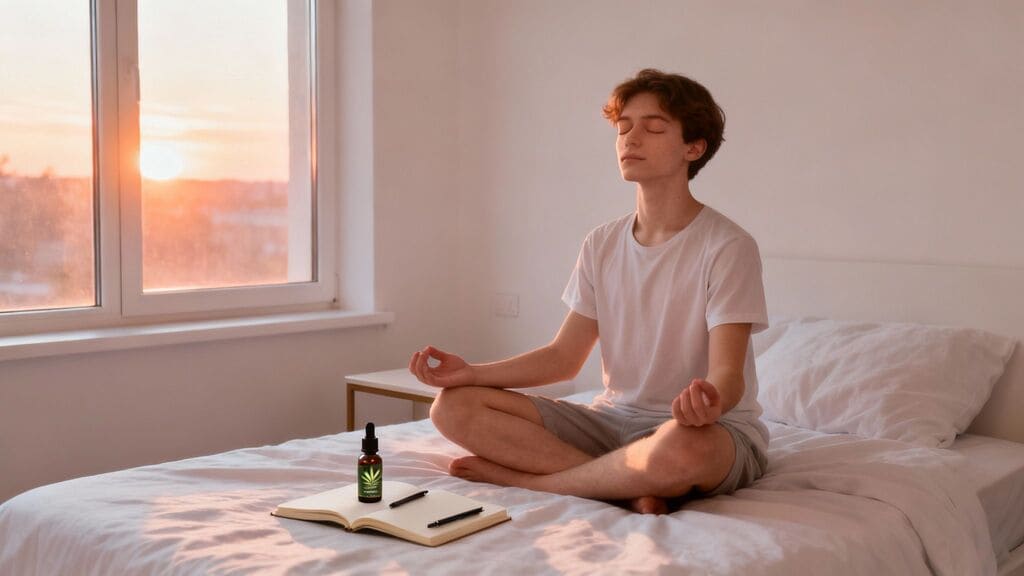Waking up to a racing heart and a sense of dread is a jarring, unsettling way to start the day. If this sounds familiar, you're not alone. This immediate rush of anxiety in the morning isn't some personal failing; it's a very common response to a complex mix of things happening in your body and mind. Think of it as your body's alarm system being a little too sensitive, overreacting to the simple act of facing a new day.
Understanding the Rush of Morning Anxiety
That feeling of immediate overwhelm when you wake up can leave you feeling confused and isolated. It’s like a switch flips the moment you open your eyes, flooding your system with dread before you’ve even had a chance to properly think. This is far more than just "waking up on the wrong side of the bed"; it’s a distinct and challenging experience that millions of people face. The goal here is to help you understand what's happening under the surface, so you can see it not as a flaw, but as a signal that something needs attention.
This feeling is far from rare. Here in the UK, anxiety is a major mental health concern. During 2022/23, surveys revealed that 37.1% of women and 29.9% of men reported high levels of anxiety. It's especially common among younger people, with a 28% prevalence in those aged 16 to 29, many of whom feel this anxiety most acutely right after waking. You can read more about these UK anxiety statistics to get the bigger picture.
What Triggers This Feeling
Imagine your body has an internal alarm clock designed to get you ready for the day. For those of us who get morning anxiety, this system is on high alert. Instead of a gentle nudge to wake up, it sounds a loud, blaring alarm, triggering a full-blown fight-or-flight response for no obvious reason.
This intense internal reaction is often fuelled by a combination of biological processes and subconscious worries that have been simmering overnight. Your brain, already anticipating the pressures of the day ahead, can kickstart a cascade of stress hormones that leaves you feeling both physically and mentally awful.
You are not "broken" or "weak" for feeling this way. Morning anxiety is a recognised phenomenon with tangible causes, and more importantly, it can be managed with the right strategies and understanding.
To get a handle on this, it really helps to break down the common triggers and the symptoms they produce. By starting to identify your own patterns, you can begin to untangle the experience and see it more clearly.
Morning Anxiety at a Glance: Key Triggers and Symptoms
Let's quickly summarise what often contributes to that morning rush of anxiety and how it typically shows up. This table breaks down the main internal and external factors and the common physical and mental signs you might experience.
| Category | Common Examples |
|---|---|
| Key Triggers | Anticipatory stress about the workday, unresolved worries from the previous day, poor sleep quality, blood sugar dips, or natural cortisol spikes upon waking. |
| Physical Symptoms | Increased heart rate, tense muscles (especially in the jaw, neck, and shoulders), stomach unease or nausea, and a feeling of restlessness. |
| Mental Symptoms | Racing thoughts about to-do lists, a pervasive sense of dread, difficulty concentrating, irritability, or feeling instantly overwhelmed. |
Recognising these triggers and symptoms is the first step. When you can name what’s happening, you take away some of its power and can begin to explore ways to bring a sense of calm back to your mornings.
The Biology Behind Your Morning Jitters
Waking up with a jolt of anxiety can feel deeply personal and confusing, as if your own mind has decided to turn on you before the day has even started. The truth is, a lot of what you’re feeling is rooted in your body's basic biology. That wave of unease isn’t a personal failing; it’s often just your natural systems being a bit overzealous.
To get to the bottom of this, we need to talk about a key player in your morning routine: cortisol. It’s often branded the "stress hormone," but its real job is to help your body respond to stress and manage energy levels. Cortisol follows a natural daily rhythm, and its levels are highest within the first hour of waking up. This spike is known as the Cortisol Awakening Response (CAR).
Think of the CAR as your body’s built-in alarm clock combined with a personal drill sergeant, shouting, "Time to get up and face the day!" This hormonal surge is designed to sharpen your focus, give you a jolt of energy, and get you moving. For most people, this process goes unnoticed. But if you're already prone to anxiety, this natural surge can feel less like a gentle nudge and more like a five-alarm fire, kicking your nervous system into overdrive for no good reason.
Why Your Body Feels on Edge
Cortisol isn't the only biological factor at play here. The state your body is in after a long night's sleep can also create the perfect storm for morning anxiety. A few interconnected systems are usually responsible for that feeling of unease.
One major contributor is blood sugar. Having fasted all night, your blood glucose levels are naturally on the lower side. If they dip too far, your body might release adrenaline to compensate—a survival mechanism designed to make you find food, fast. The trouble is, this adrenaline rush can trigger symptoms that feel identical to an anxiety attack: a racing heart, shakiness, and a sudden sense of panic.
On top of that, the quality of your sleep has a direct say in how you feel when you wake up. A night of restless or fragmented sleep means your brain hasn't had the chance to complete its essential overnight repairs. More specifically, the prefrontal cortex—the part of your brain that handles emotional regulation and logical thought—doesn't get to fully recharge. This leaves the amygdala, your brain’s emotional fear centre, much more reactive and in the driver's seat when you open your eyes.
This infographic shows how a racing mind connects to common triggers and the body's physical response. As you can see, that feeling of waking dread is a complex dance between what you're thinking and how your body is reacting.
As you can see, that feeling of waking dread is a complex dance between what you're thinking and how your body is reacting.
The Broader Biological Context
These biological reactions don't happen in a vacuum. They’re shaped by your overall health, your genetics, and even wider societal trends. In the UK, anxiety diagnoses have risen sharply, which tells us that more people are reporting these kinds of symptoms than ever before. An analysis of UK primary care records found that from 2003 to 2018, the incidence of anxiety symptoms climbed from 6.2 to 14.7 per 1000 person-years, with the steepest increases happening after 2013 and hitting young adults the hardest.
Your body is a complex network of interconnected systems. When one part, like your hormonal rhythm or blood sugar, is out of balance, it can create a ripple effect that your brain interprets as anxiety.
Understanding these mechanics is the first step toward feeling more in control. Your body has an incredible capacity for balance, and many of its systems are regulated by a core network. You can discover more by reading about the key facts of the endocannabinoid system, which plays a huge part in maintaining this internal stability. Once you grasp the "why" behind your morning jitters, you can start to shift from feeling like a victim of your anxiety to being an active participant in managing it.
How Your Mind Creates Morning Dread
While your body’s chemistry plays a huge part in morning anxiety, your mind is an equally powerful player in the game. It’s a common myth that the brain simply switches off when we sleep. The truth is, it’s actually quite busy processing memories, emotions, and—most importantly for this topic—any unresolved worries from the day before.
When you finally wake up, these simmering concerns can all hit you at once, creating an instant wave of mental and emotional dread. This isn’t just a case of waking up on the wrong side of the bed; it's your brain handing you a pre-prepared list of everything it thinks you should be worrying about today.
Your Brain on High Alert
Think of your mind’s threat-detection system like a smoke detector. A good one goes off when there's a real fire, giving you a vital warning. But a mind prone to anxiety has a detector that's far too sensitive—it’ll trigger a full-blown alarm just from a single piece of burnt toast.
This ‘threat-sensitive’ mindset means your brain is constantly scanning for potential problems. For anyone dealing with anxiety in the morning, this system kicks into overdrive the second you become conscious, immediately searching for what could possibly go wrong.
This state of hypervigilance is an exhausting way to live, turning the simple act of waking up into a mentally draining ordeal. Realising this pattern is happening is the first step toward recalibrating your internal alarm.
This feeling is incredibly common and often disruptive. Research by the Mental Health Foundation in the UK found that nearly 73% of adults had felt anxious at some point in the previous two weeks. More tellingly, over a quarter (26%) reported anxiety so severe it stopped them from doing daily tasks—a scenario many with morning anxiety will recognise all too well. Read the full research about these findings on anxiety in the UK.
How You Unintentionally Prime Your Mind for Anxiety
Often, without even realising it, our own habits and thought patterns are pouring fuel on the fire. We unintentionally get our minds ready for a state of high alert, making that morning wave of dread almost inevitable. This priming process can happen in a few key ways.
Common Mental Triggers Include:
- Anticipatory Stress: Lying in bed thinking about a difficult meeting, a packed schedule, or a stressful commute. Your mind starts trying to solve problems before your feet have even hit the floor, creating a sense of being overwhelmed before the day has even begun.
- Negative Self-Talk: Waking up and immediately thinking, "I can't handle today" or "I'm going to mess up that presentation." This internal chatter sets a negative tone from the get-go and reinforces feelings of inadequacy and fear.
- The Habit of 'Doomscrolling': Grabbing your phone first thing and scrolling through alarming news headlines or stressful work emails. This habit directly feeds your brain's threat detector, confirming its suspicion that the world is a dangerous and demanding place.
These aren't just passing worries; they are mental habits that get stronger over time. Each morning you engage in them, you reinforce the neural pathways that link waking up with feeling anxious. This cycle can be incredibly tough to break without a conscious effort. Learning how to stop overthinking for a calmer mind is a crucial skill in taking this pattern apart.
Figuring out your specific mental triggers is key. Do you worry about work? Are you anxious about social plans? Pinpointing the source of your dread helps you see it not as a vague, uncontrollable feeling, but as a specific thought pattern you can start to address and change.
Actionable Strategies to Reclaim Your Mornings

Knowing why you feel anxious in the morning is a great first step, but you need a practical toolkit to actually start dismantling it. This is where we move from theory to action and you begin to take back control. The strategies below are grounded in real evidence, broken down into simple steps you can start using as early as tonight.
Think about it this way: a calm morning rarely happens by accident. It's built the night before. By creating a deliberate "evening shutdown" routine, you’re preparing the ground for a more peaceful awakening. This helps you start the day feeling centred, rather than being ambushed by stress the moment you open your eyes.
Create a Calming Evening Shutdown Routine
The fight against anxiety in the morning actually starts the evening before. A solid evening routine is a powerful signal to your brain and body that it’s time to wind down, making it easier to drift into restorative sleep. This simple habit can stop unresolved thoughts from bubbling away overnight and hitting you with a wave of dread at dawn.
A powerful routine doesn’t need to be complicated. The main goal is simply to reduce stimulation and encourage relaxation.
- Disconnect From Screens: That blue light from your phone and tablet messes with melatonin, the hormone that tells your body it’s time to sleep. Try to put all screens away at least an hour before you plan to turn in.
- Perform a 'Brain Dump': Keep a notebook by your bed. Before you settle down, jot down everything that's buzzing around in your head—worries, to-do lists, random ideas. Getting it all down on paper frees your mind from the job of holding onto it.
- Engage in a Relaxing Activity: This could be reading a physical book (not a tablet!), listening to some chill music, or doing a few light stretches. The key is to pick something you genuinely find soothing.
This whole process is about closing the mental "tabs" from your day, preventing them from running in the background while you're trying to rest. You’re essentially telling your anxious mind, "We're done for today. We can pick this up tomorrow."
Implement a Gentle Morning Wake-Up Practice
How you spend the first few minutes of your day can set the tone for the next several hours. Instead of grabbing your phone and immediately plunging into emails, texts, and news alerts, create a small buffer of calm. This buffer is crucial for interrupting that automatic leap from sleep straight into stress mode.
A mindful morning routine isn’t about cramming more tasks into your day. It’s about consciously creating a small pocket of peace to ground yourself before the world rushes in.
Start with something incredibly simple. The aim here is consistency, not complexity. A five-minute practice you do every single day is far more powerful than an hour-long routine you only manage once a week.
A Simple 5-Minute Calming Sequence:
- Conscious Breathing (2 Minutes): Before you even get out of bed, place a hand on your belly. Breathe in slowly through your nose for a count of four, feeling your stomach rise. Hold it for four counts. Then, exhale slowly through your mouth for six counts, feeling your stomach fall. Repeat. This simple technique activates your body’s natural relaxation response.
- Gentle Stretches (2 Minutes): While still in bed, gently stretch your arms over your head, point and flex your toes, and slowly hug your knees to your chest. This helps release the physical tension that so often comes packaged with anxiety.
- Positive Affirmation (1 Minute): Choose a simple, calming phrase to repeat to yourself. Something like "I can handle today with ease" or "I am safe and in control." This helps to challenge the negative thought spirals that fuel morning anxiety.
To help you decide which practices might fit best into your life, it's useful to see how they stack up against each other.
Comparing Morning Routine Techniques for Anxiety
This table breaks down a few popular techniques to help you find the right starting point for your personal routine.
| Technique | Primary Focus | Time Commitment | Best For |
|---|---|---|---|
| Mindful Breathing | Calming the nervous system | 2-5 minutes | Immediately reducing physical symptoms of anxiety like a racing heart. |
| Journaling | Externalising worries and thoughts | 5-15 minutes | Those with a racing mind and looping, stressful thoughts. |
| Gentle Stretching | Releasing physical tension | 5-10 minutes | Easing body aches, stiffness, and the "knotted stomach" feeling. |
| Mindful Hydration | Grounding and rehydrating | 2-3 minutes | A simple, accessible starting point for anyone feeling overwhelmed. |
Each of these can be a powerful tool. The best approach is to experiment and see what makes you feel the most grounded and prepared for the day ahead.
Fuel Your Body to Stabilise Your Mood
What you eat and drink first thing has a direct and surprisingly fast impact on your brain chemistry and anxiety levels. It might feel essential to reach for a strong coffee on an empty stomach, but for an anxious mind, this can backfire spectacularly.
Caffeine triggers the release of adrenaline, which can amplify your body's stress response. When you combine that with cortisol levels that are already naturally high in the morning, it can easily tip you over from 'awake' into 'acutely anxious and jittery'. This often leads to a sharp energy crash later on, which only makes your mood worse.
Instead, start your day with a breakfast that provides sustained energy and keeps your blood sugar stable.
- Prioritise Protein and Healthy Fats: Foods like eggs, Greek yoghurt, nuts, or avocado give you a slow, steady release of energy. This prevents the blood sugar spikes and crashes that can feel frighteningly similar to the physical symptoms of a panic attack.
- Hydrate with Water First: Before any tea or coffee, drink a large glass of water. Even mild dehydration can make you feel more tired and anxious, so rehydrating after a night's sleep is a simple but incredibly effective first step.
By making these small, intentional changes, you can directly tackle the physiological triggers of morning anxiety. These strategies work together to calm your nervous system, release physical tension, and stabilise your mood, giving you a much stronger foundation for a better day. For those looking for more ways to support their system, exploring other natural ways to boost energy can provide additional support for your overall well-being.
Building Long-Term Resilience to Anxiety

While quick calming tactics are brilliant for getting you through a tough morning, finding lasting peace is a different ball game. Think of it like looking after a house: you can patch a leak for a temporary fix, but strengthening the foundations is what stops problems from showing up again and again. Real, long-term relief from anxiety in the morning comes from simple lifestyle shifts that build up your overall resilience.
Don't worry, this isn't about piling more pressure onto your life. It’s about making small, sustainable tweaks that add up over time, creating a powerful buffer against stress. Let’s explore how to build a solid foundation of mental and physical wellbeing that makes you far less vulnerable to anxiety’s grip when you wake up.
Strengthen Your Body to Calm Your Mind
The link between physical activity and mental health is incredibly powerful. Regular exercise does so much more than keep you fit; it’s one of the most effective tools we have for regulating the very systems that fuel anxiety. When you get your body moving, you’re actively taking control of your stress hormones.
Exercise helps your body process excess cortisol and adrenaline, basically burning off the nervous energy that leaves you feeling wound up and on edge. At the same time, it ramps up the production of endorphins—your body’s own natural mood lifters. A brisk walk, a gentle yoga session, or a light jog can genuinely shift your brain chemistry towards a calmer state.
Regular, moderate exercise is like hitting a daily reset button for your nervous system. It teaches your body how to handle stress and return to a state of balance, making you more resilient next time it crops up.
The benefits don't stop there, either. Study after study shows that people who exercise regularly enjoy deeper, more restorative sleep. This improved sleep quality gives the emotional regulation centres in your brain a proper chance to recharge, meaning you’re less likely to wake up with your internal alarm system already blaring.
Cultivate a Resilient Gut and Brain
You’ve probably heard the gut called our "second brain," and for very good reason. An enormous network of neurons lines your digestive system, and it's in constant conversation with the brain in your head. This gut-brain axis means the health of your digestion has a direct line to your mood and anxiety levels.
When the community of bacteria living in your gut—your microbiome—is out of balance, it can contribute to feelings of anxiety and stress. Supporting a healthy gut is a powerful, long-term strategy for promoting a sense of calm.
Foods that support a calmer mind include:
- Probiotic-rich foods: Things like natural yoghurt, kefir, and fermented foods help to populate your gut with beneficial bacteria.
- Fibre-rich foods: Wholegrains, fruits, vegetables, and legumes are essential for feeding these good bacteria, helping them to thrive.
- Omega-3 fatty acids: Found in oily fish like salmon, as well as in flaxseeds and walnuts, these fats are vital for brain health and have been shown to help reduce anxiety.
By focusing on a diet that nourishes your gut, you are actively building a more stable and resilient mental state. This isn't a quick fix, but a sustained way of building wellbeing from the inside out.
Rewire Your Brain with Mindfulness
Mindfulness is the mental equivalent of going to the gym. It’s a training exercise that can completely change how your brain responds to stress over time. With consistent practice, mindfulness helps to strengthen the prefrontal cortex—your brain's hub for rational thought—while calming down the amygdala, its fear centre.
This doesn't mean you need to sit in meditation for hours every day. Starting with just five or ten minutes can make a world of difference. The real goal is to train your attention, learning to observe your anxious thoughts without getting swept away by them.
Over time, this practice rewires your brain’s default settings. Instead of waking up and being immediately dragged into a spiral of worry, you create a bit of breathing room. You learn to spot the feeling of anxiety as it appears, acknowledge it without judgement, and gently guide your focus back to your breath or the present moment. This skill is the absolute cornerstone of long-term emotional resilience.
Frequently Asked Questions About Morning Anxiety
Even after getting to grips with what might be causing that anxiety in the morning, you've probably still got a few questions buzzing around. This section is all about getting you clear, direct answers to the things we hear most often. The idea is to clear up any lingering confusion so you can move forward with a plan that feels right.
Think of this as fitting in the final few pieces of the puzzle. Once we've clarified the details, you'll feel much more prepared to take back your mornings. Let's jump into the questions that tend to pop up.
Is It Normal to Have Anxiety in the Morning?
Yes, it's surprisingly common to feel a wave of anxiety when you wake up. It’s all tied to your body’s main stress hormone, cortisol, which naturally peaks in the morning to get you up and going. This is a perfectly normal biological kickstart known as the Cortisol Awakening Response.
But there’s a massive difference between a gentle nudge to get out of bed and a full-blown sense of dread. If that anxiety is intense, shows up almost every day, and makes it hard to even start your day, it’s more than just the usual biological process. It all comes down to severity and frequency—if it's consistently ruining your mornings, it's definitely something to address.
Waking up anxious is a valid experience. It’s simply a sign that your body's internal alarm system is a bit oversensitive. Realising this isn't a weakness; it's the first step towards recalibrating that response.
Getting to the bottom of the causes and bringing in some calming strategies can make a world of difference. For a deeper dive into practical solutions, you might want to explore these natural remedies for anxiety with these top 10 relief tips, which fit perfectly with the routines we've discussed.
Can What I Eat or Drink Cause Morning Anxiety?
Absolutely. What you eat and drink has a direct, powerful impact on your mood and anxiety levels, especially first thing in the morning. Your choices can either set you up for a calm, stable start or pour fuel on the anxiety fire.
For instance, grabbing a coffee or a sugary snack on an empty stomach sends your blood sugar on a wild ride, spiking and then crashing dramatically. That rollercoaster can trigger physical symptoms—like shakiness, a racing heart, and irritability—that feel almost identical to an anxiety attack. Likewise, having a few drinks the night before might help you drift off, but it messes with your sleep cycle later on, leading to poor rest and leaving you feeling frayed when you wake up.
To build a more stable morning, try these simple nutritional swaps:
- Instead of: A strong black coffee first thing.
- Try: A big glass of water to rehydrate, followed by a proper breakfast before you even think about caffeine.
- Instead of: A sugary pastry or cereal.
- Try: A meal packed with protein and healthy fats, like eggs with avocado or Greek yoghurt with nuts. This will give you a slow, steady release of energy.
When Should I Seek Professional Help?
It's always a good idea to seek professional help if your morning anxiety feels overwhelming and starts to seriously get in the way of your life. Self-help strategies are fantastic, but sometimes you need more targeted support to get to the root of what's going on.
Consider having a chat with your GP or a therapist if you notice any of the following:
- Your anxiety regularly stops you from getting to work, school, or tackling your daily responsibilities.
- You're having frequent or intense panic attacks, whether in the morning or at other times.
- Your anxiety is paired with a persistent feeling of hopelessness or a persistently low mood.
- The strategies you've tried on your own just don't seem to be making a real difference after a few weeks of consistent effort.
A professional can offer treatments like Cognitive Behavioural Therapy (CBT), which is known to be highly effective for managing anxiety.
How Long Does It Take for New Routines to Work?
This is such an important question, and the honest answer is that it's different for everyone. When you start bringing new calming routines into your life, like morning breathing exercises or an evening "brain dump," you might feel a small bit of relief in just a few days. That initial shift can be really encouraging.
However, for deep, lasting change, consistency is far more important than perfection. It usually takes several weeks of sticking with a new habit before it starts to feel natural and your nervous system genuinely adapts to a calmer baseline. Be patient and kind to yourself through the process. The goal is steady progress, not an overnight miracle.
At SMOKO CBD, we believe in supporting your wellness journey with high-quality, natural solutions. If you're looking for an additional tool to help manage feelings of anxiety and find your morning calm, explore our premium, UK-made CBD products at https://smokocbd.com.









